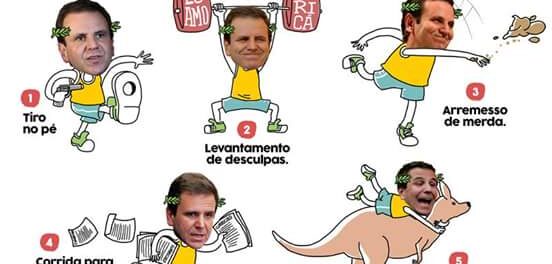
“Wit is a dangerous weapon,” wrote French philosopher Michel de Montaigne. George Orwell remarked that every joke is a tiny revolution. Mark Twain proclaimed laughter as the only truly effective weapon humanity possesses. Activists in Rio de Janeiro have creatively turned that weapon on the Rio 2016 Olympic Games, following activists in London who used humor to highlight various grievances including environmental damage by Olympic sponsors like BP.
In Activism and the Olympics, Olympics scholar Jules Boykoff documented how activists in London felt they needed to be creative, as any other form of intervention would be impossible due to police repression. Humor was also a deliberate strategy to widen the audience of Olympic criticism, reaching out beyond those who were already critical. That said, humor was always acknowledged to be just one component of the patchwork of activism in the lead up to the 2012 summer Olympics.
In Rio, graffiti sprayed around the Vila Autódromo favela next to the Olympic Park formed a fertile ground for puns. Sprayed on the wall dividing the community from the Olympic Park construction site was the word “Olim(piada).” “Olimpíada” is the Portuguese word for the Olympics, while “piada” translates as “joke.” Activists even chanted this in protest as the Vila Autódromo Neighborhood Association building was torn down. Other graffiti took the common phrase “paz e amor” (peace and love) and twisted it to “Paes sem amor” (Paes without love). By switching the Portuguese word for peace to the name of Mayor Eduardo Paes, the graffiti artist highlighted the lack of humanity and love in the mayor’s policy of forced evictions.
The Pacifying Police Unit (UPP) program, a key policy component of the Olympic legacy promise to make the city secure, has also attracted puns along with heavy criticism. Coletivo Papo Reto‘s Raull Santiago wrote in November 2015 about Complexo do Alemão‘s five years of “paciFICÇÃO” (paci-FICTION), highlighting the Pacifying Police Unit (UPP) program’s failure to bring about the peace its name promised.
Over Easter 2016, the hashtag #PazcoaNoAlemão was trending on social media, mixing the Portuguese words for Easter (Pascoa) and peace (paz) to ask for respite from shootings in the community.
Recently, Coletivo Papo Reto and other community organizations have hijacked a slogan used by Brazilians unhappy with the impeachment proceedings against President Dilma Rousseff. The original impeachment phrase involved beginning any conversation with, “first things first, out with Temer” (primeiramente, fora Temer), in reference to the interim president. For many favela residents, the disregard for their basic human rights is a far more pressing concern, leading some to regularly use and post the phrase “first things first, out with the UPP” (primeiramente, fora UPP).
The video below, posted on the Maré Vive Facebook page, parodies potential Olympic sports in a favela, including athletics (police running around with guns) and shooting at poor, black favela residents. “Foda-se,” created with the Olympic rings in the opening of the video, translates simply as “f*** it.”
The Popular Committee on the World Cup and the Olympics, an activist group coordinating resistance against the changes the Olympics have brought to the city of Rio, published a countdown to the Games called “Cem dias sem direitos” (100 days without rights), playing on the similarity between the pronunciation of the Portuguese words for “100” written “cem,” and “without” written “sem.”
People have also drawn the connection between the Olympics and the political scandals engulfing Brazil using the hashtag #Olimpeachment, while geographer Christopher Gaffney’s hashtag below highlights the excesses of the city’s planning in recent years with another nod to Eduardo Paes.
After building and destroying a velodrome for the 2007 PanAm #Rio2016 spends lavishly on another. #whoateallthepaes https://t.co/lG4mkOBCXa
— Christopher Gaffney (@geostadia) January 7, 2016
A movement to put out the Olympic torch during the relay around the country set up Facebook pages encouraging people to extinguish the flame in São Paulo and Rio de Janeiro, which together have attracted over 85,000 followers, and several other Brazilian cities. Initial attempts to do this with buckets of water and even fire extinguishers were unsuccessful, but on July 27, protests in Angra dos Reis, in the state of Rio, led the torch carriers to retreat onto a bus, Olympic flame extinguished. The International Olympic Committee runs on symbolism, so to put out this potent symbol of the Olympic movement is a way of mocking the Olympics, demonstrating the anger over the massive spending on the Games while more important issues for residents of Rio and Brazil go ignored and underfunded.
Infrastructure in neighborhoods outside the Olympic site regions, both in formal and informal neighborhoods, has been notoriously neglected in these pre-Olympic years. In the historic central neighborhood of Santa Teresa residents protested in 2015 by creating a mocking “Santa Teresa Olympic Park” video, highlighting the constant state of slow repair the community had been living for a half-decade by depicting an athlete competing in the neighborhood’s “new Olympic park.”
Humor is an important part of activism, helping reach new audiences while giving organizers the energy to carry on. With a joke in the contemporary age of social media, where memes spread like wildfire, an activist’s political point can reach tremendous new audiences. This opens space for critical perspectives about subjects like the Olympics and the UPPs, which are sometimes presented in an uncritically positive light by mainstream media. While some argue that making jokes dilutes the message, within a larger vein of activism, humor can engage new audiences in critical discourses in a way that other forms of activism simply cannot. While laughing won’t change anything on its own, it can bring people together—and when enough people organize together anything is possible.
Adam Talbot is a doctoral researcher at the Centre of Sport, Tourism and Leisure Studies at the University of Brighton, UK. He is undertaking an ethnographic project focusing on social movements and activism at the Rio 2016 Olympic Games.


